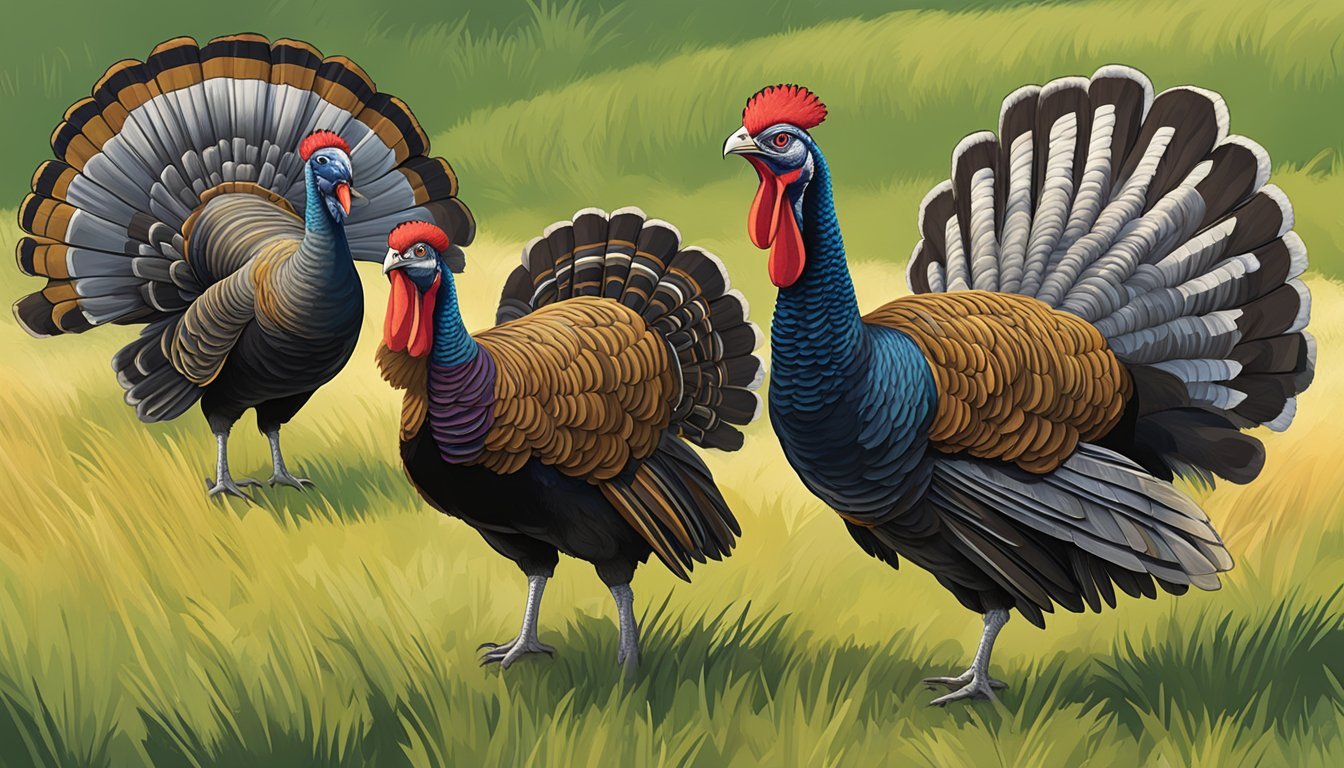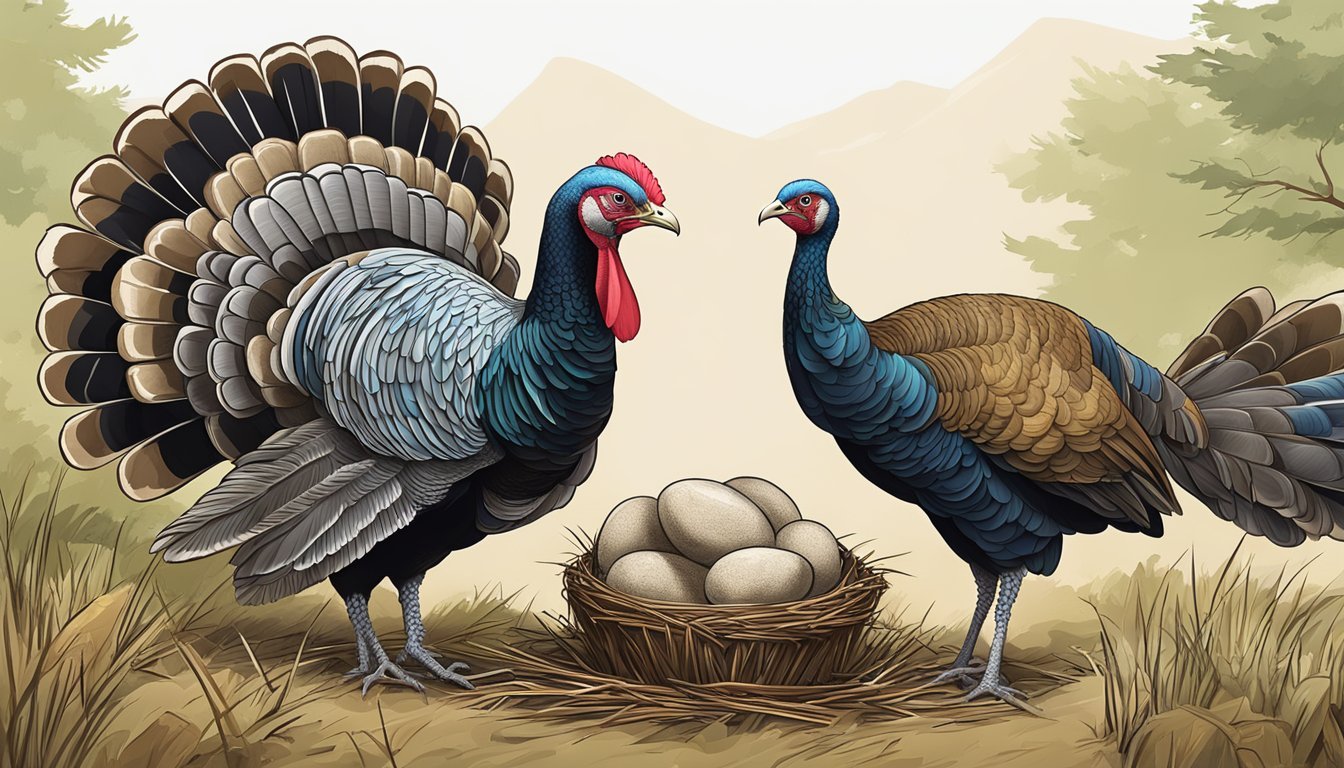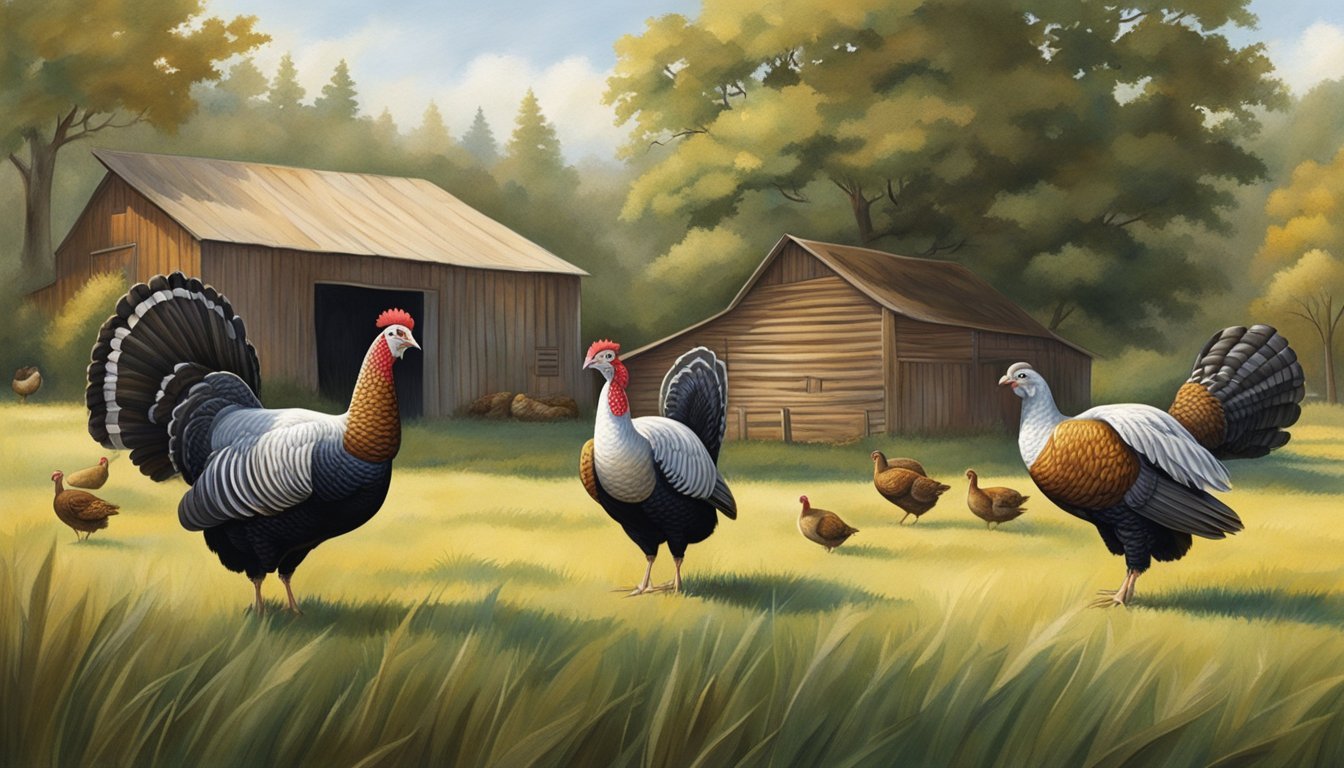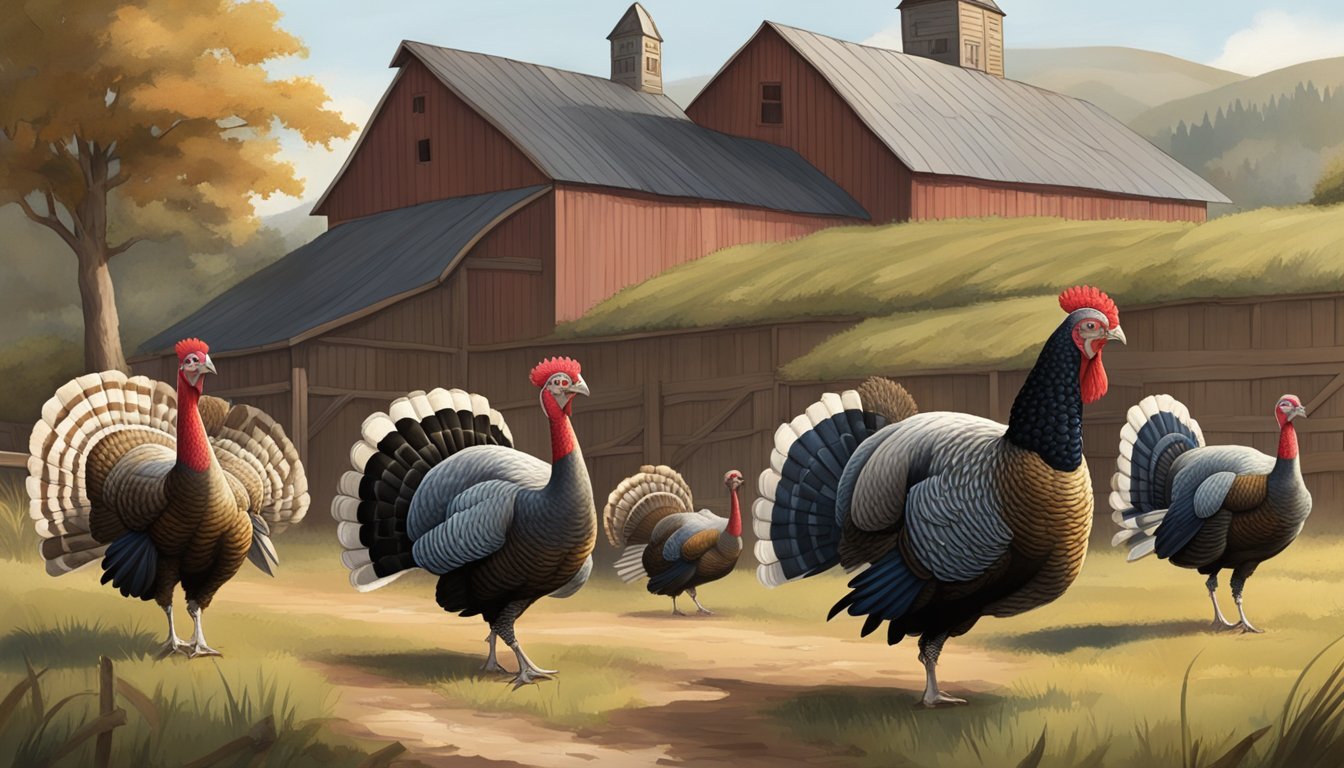Heritage Turkeys
Unveiling the Rich History and Flavor Profiles
Heritage turkeys (What wine goes well with turkey?) have been gaining popularity in recent years, often sought out by consumers who value traditional, flavorful, and sustainable meats. These birds, known as heritage breeds, are descendants of the wild turkeys native to North America and hold a significant appeal for both their historical value and their unique taste. The American Poultry Association (APA) has guidelines that identify a true heritage turkey, ensuring the preservation of these rare breeds.
One such heritage breed is the Standard Black, Bronze turkey, a variety that has a long history in the United States. These birds are known for their robust flavor and high-quality meat, a characteristic that has made them a favorite among farmers and consumers alike. Many heritage turkey enthusiasts claim that these birds boast a deeper, richer taste than conventional varieties, along with a more attractive appearance when cooked.
Heritage turkeys have experienced a resurgence due to increased interest in sustainable, local agriculture. As a result, the breeding, raising, and consumption of heritage breeds like the Standard Bronze have become an important part of preserving both American culinary history and the genetic diversity of turkey populations.
Heritage turkeys are a unique breed of turkeys that have been around for generations. These birds have a distinctive skeletal structure and a moderate rate of growth that sets them apart from their factory-farmed counterparts. Some popular breeds of heritage turkeys include the Slate, Bourbon Red.
Heritage turkeys are not only beautiful turkeys to look at, but they also have a rich, flavorful taste that is hard to find in modern turkeys such as the Broad-Breasted Giant White turkey, which is typically raised as a flavorful production turkey in large quantities. Overall, heritage turkeys are a great alternative to factory-farmed turkeys for those looking for a more natural and sustainable meat option.
History and Origin of Heritage Turkeys
Early Domestication and Breeds
Heritage turkeys have a rich history that can be traced back to the early domestication of wild turkeys in North and Central America. The wild turkey (Meleagris gallopavo) is native to these regions and was domesticated by indigenous peoples over 2,000 years ago.
Over time, domesticated turkeys were selectively bred for desirable traits, leading to the development of the heritage breed as we know it today. Some key characteristics of these breeds include:
Slow growth rates
Long, productive outdoor lifespan
Natural mating ability
Some notable heritage turkey breeds include Bourbon Red, Standard Bronze, and Narragansett.
Preservation Efforts
In the 20th century, industrialization led to the rise of commercial, fast-growing turkey breeds, which quickly overshadowed the heritage breeds. However, organizations like the Livestock Conservancy and the American Livestock Breeds Conservancy have played a significant role in the preservation of heritage turkey breeds.
These organizations focus on conserving and promoting heritage breeds through various efforts, such as:
Education and outreach: Raising awareness about the importance of genetic diversity in livestock species and the benefits of heritage turkey breeds.
Conservation breeding: Establishing and supporting breeding programs to maintain the genetic viability of heritage turkeys.
Market development: Encouraging farmers and consumers to choose heritage turkeys, can help create a demand for these breeds and ensure their long-term survival.
Thanks to these efforts, interest in heritage turkeys has grown in recent years, and the population of these breeds is slowly recovering, ensuring their continued presence in our diverse agricultural landscape.
Breeds of Heritage Turkeys
Bourbon Red
Bourbon Red turkeys, originating in Kentucky, are known for their beautiful, rich, reddish-brown plumage and their flavorful, tender meat. This breed has a relaxed and friendly temperament, making it an excellent choice for small farms and backyard enthusiasts. As a medium-sized bird, adult toms weigh around 33 lbs, while adult hens weigh around 18 lbs.
Narragansett
The Narragansett turkey, named after Narragansett Bay in Rhode Island, is a unique and historic breed, descending from a cross between wild turkeys and European domesticated turkeys. They are characterized by their stunning grey, black, and white plumage. Narragansett turkeys are known for their calm disposition, making them an excellent choice for those looking for a sociable and easy-to-handle heritage breed. These birds typically weigh between 22-28 lbs for toms and 12-16 lbs for hens.
Slate Varieties
The Slate variety, also sometimes known as Lavender or Blue Slate turkeys, comes from a rare gene that produces a beautiful, blueish-grey color in their feathers. This striking appearance sets them apart from other heritage breeds. They are a docile and friendly breed, and their size ranges from 23-30 lbs for males and 14-20 lbs for females. Slate turkeys are an excellent addition to any flock.
Royal Palm and White Holland
The Royal Palm turkey is a smaller breed, featuring an eye-catching contrast between its white plumage, with black accents on the tips of their feathers. They are a lively breed and are known for their ability to fly well. Royal Palm males weigh approximately 16-22 lbs, and females average 10-12 lbs.
The White Holland turkey is another unique heritage breed, known for their pure white feathers and calm demeanor. As a larger bird, males can reach an impressive 30-40 lbs, while females weigh around 20-25 lbs.
Heritage turkey breeds such as Bourbon Red, Narragansett, Slate, Royal Palm, and White Holland offer a variety of unique characteristics, making them a wonderful choice for small-scale poultry farmers and enthusiasts alike. These breeds maintain traditional traits, ensuring the continuation of their valuable genetic diversity.
Breeding and Reproduction
Breeding and reproducing heritage turkeys, like the Midget White, involve prioritizing natural reproduction for long-term health. These domestic turkeys, known for breasted turkeys with dark pin feathers, require more "birds time" to reach marketable weight. The slower rate of growth ensures the development of healthy organs.
Unlike turkeys bred solely for food, heritage turkeys emphasize a productive lifespan and natural reproduction methods. This approach preserves unique traits across generations, contributing to the sustainability of these traditional breeds.
Mating Behaviors
Heritage turkeys display distinct mating behaviors that help to promote successful reproduction. Males, also known as toms or gobblers, begin the mating process by puffing up their feathers, fanning their tails, and emitting deep, low-frequency calls to attract females. In response, females, or hens, will signal their receptiveness by crouching down.
A notable aspect of heritage turkeys' mating behavior is their ability to naturally breed. Unlike commercial breeds, these birds don't require artificial insemination. This allows for a more sustainable and ethical breeding process.
Fertility Rates
The fertility rates of heritage turkeys are quite impressive, contributing to the overall health and genetic diversity of their populations. Here is a table detailing the approximate fertility rates of popular heritage turkey breeds:
Bourbon Red
Fertility Rate: 70% - 80%
Narragansett
Fertility Rate: 75% - 85%
Royal Palm
Fertility Rate: 65% - 75%
Standard Bronze
Fertility Rate: 80% - 90%
These high fertility rates ensure that there are plenty of offspring produced, allowing the population to maintain genetic diversity and adapt to changing environments.
Breeding Stock Management
Breeding stock management is crucial for maintaining the integrity and sustainability of heritage turkey populations. When choosing breeding stock, it's important to prioritize birds that exhibit the following traits:
Good health: Physically fit and free of any diseases or deformities.
Genetic diversity: Avoid inbreeding by selecting unrelated birds.
Desirable traits: Select birds that show desirable characteristics, such as good size, strong reproductive abilities, and high fertility rates.
By carefully selecting breeding stock, heritage turkey populations can be maintained at a high level of genetic diversity, ensuring their long-term survival and success as a sustainable food source.
Raising Heritage Turkeys
Feeding and Foraging
When raising heritage turkeys, it is essential to provide proper nutrition. A well-balanced diet will ensure optimal growth and health for these birds. Consider implementing a pasture-based feeding system to encourage natural foraging behaviors.
Supplemented diet: Provide a formulated turkey feed that contains essential nutrients, vitamins, and minerals. Growing poults (young turkeys) need to receive the correct balance of protein and amino acids.
Foraging opportunities: Allow turkeys to graze and forage on a pasture, which can help supplement their diet and foster natural behaviors. Small farmers can designate a special area for their turkeys to explore and find insects, seeds, and other delicacies.
Grit and water: Turkeys need access to fresh water and grit (small stones or coarse sand) to aid in digestion.
Shelter and Confinement
Heritage turkeys require appropriate shelter and protection from the elements and potential predators. Design a suitable environment considering the following factors:
Roosting: Provide roosting areas elevated off the ground to give turkeys a safe place to perch at night. This can help reduce stress and prevent injury.
Ventilation: Ensure proper air circulation in the turkey shelter to minimize the risk of respiratory issues and help maintain a healthy environment.
Confinement: While heritage turkeys benefit from foraging opportunities, it is crucial to establish a confinement area to protect them during inclement weather or from predators. Fences or other barriers can be used effectively, and care should be taken to monitor for weak spots that could allow predators access to the flock.
Health and Veterinary Care
Taking care of the health of heritage turkeys involves specific considerations for their well-being, especially in a pasture-raised environment.
When it comes to heritage turkey mates, ensuring the compatibility and natural breeding among these birds is crucial for maintaining the unique characteristics of Heritage varieties. This includes attention to color varieties, as these can be distinctive traits in different generations of turkeys.
In a pasture-raised setting, the focus is not only on health but also on factors like the meat ratio and reaching mature weight naturally. Heritage turkeys are known for their quality meat, and allowing them to thrive in a natural environment contributes to optimal health and the desired meat attributes.
Regular health assessments and veterinary care are vital to maintain the well-being of heritage turkeys:
Regular inspections: Farmers should regularly inspect their flock for any signs of illness or injury, such as discolored combs, changes in appetite, or difficulty walking.
Parasite control: Heritage turkeys are susceptible to external and internal parasites, including mites, lice, and worms. Parasite control measures should be tailored to the specific needs of the flock and geographic region, with input from a veterinarian.
Vaccinations and medications: Consult with a veterinarian about an appropriate vaccination schedule for your heritage turkeys to reduce the risk of disease. Use medications judiciously and under the guidance of a veterinarian to avoid promoting antibiotic resistance.
The health and veterinary care of heritage turkeys involve thoughtful management of their environment, paying attention to unique traits, and color varieties, and ensuring compatibility among heritage turkey mates to preserve these characteristics across generations.
Culinary Profile
The culinary profile of heritage turkeys is quite impressive. These birds are known for their excellent flavor and delicious meat, which is why they have become increasingly popular among food lovers. One of the reasons behind their superior meat quality is that heritage turkeys are raised using traditional methods, such as pasture-raising, which allows them to develop a more robust flavor profile.
Moreover, heritage turkeys come in different feathered varieties, each with its unique taste. They also tend to be larger in size than commercial turkeys, making them ideal for feeding larger groups of people. If you're cooking a heritage turkey, it's essential to use a meat thermometer to ensure that the meat is cooked to perfection. All in all, heritage turkeys are a great choice for those who appreciate the taste and quality of meat and want to add a touch of tradition to their table during the holiday season or any time of the year.
Flavor Differences
Heritage turkeys offer a distinct and rich flavor compared to their commercially raised counterparts. Their diet primarily consists of insects, grass, and seeds, contributing to the development of a more complex and satisfying taste. The meat is known to have a slightly gamey flavor, with bold, earthy notes and a firmer texture. This depth in flavor can elevate any dish, making heritage turkeys a popular choice among chefs and food enthusiasts alike.
Cooking Techniques
Due to the leaner nature of heritage turkeys, the cooking process is slightly different than that of the commercial variety. Here are some tips and techniques to help you achieve the perfect result:
Brining: Because the meat is less fatty, using a brine can help maintain moisture and tenderness during cooking. A simple salt and water solution or a more flavorful brine infused with herbs and spices can be used for this process.
Roasting: It is recommended to cook heritage turkeys at a lower temperature (around 325°F) for a longer period, as high heat may cause the lean meat to dry out. Basting the turkey with melted butter or oil regularly during cooking will also help keep the meat tender and moist.
Internal Temperature: When checking for doneness, aim for an internal temperature of 165°F at the thickest part of the bird. Be cautious not to overcook, as the meat can become dry and tough.
Thanksgiving Traditions
Incorporating heritage turkeys into Thanksgiving celebrations is growing in popularity, as people are becoming more mindful of their food choices and their impact on the environment. The Slow Food movement, which emphasizes the importance of preserving traditional, sustainable, and locally sourced foods, has also popularized the use of heritage turkeys for this cherished holiday meal. By featuring a heritage turkey at the Thanksgiving table, families are not only enjoying a more delicious and authentic turkey, but they are also supporting ethical farming practices and helping protect the diversity of these agricultural breeds.
Conservation and Ethics
Conservation and ethics of heritage turkeys revolve around preserving the genetic diversity of turkey breeds that were once common on homesteads. These turkeys, also known as heritage turkeys, differ from the commercial breeds in their unique characteristics such as their rich flavor, larger size, and higher proportion of dark meat.
Heritage meat has gained popularity recently, leading to a growing demand for these traditional breeds. Centuries of breeding by people who valued these qualities have resulted in a variety of heritage turkey breeds, and conservation efforts aim to maintain these breeds for future generations to enjoy. Ethical considerations include the humane treatment of the birds and ensuring that their welfare is a top priority.
Endangered Status
According to the Livestock Conservancy, many heritage turkey breeds are classified as either threatened or endangered. This is due to the increasing dominance of commercial turkey breeds, leading to a decline in biological diversity. To help preserve endangered breeds, organizations such as the Ark of Taste catalog and promote these threatened species, raising awareness about their potential extinction and the importance of their conservation.
Ethical Breeding Practices
In the world of heritage turkeys, the focus is on creating a sustainable and ethical environment for these birds. This includes maintaining proper animal welfare standards, such as providing turkeys with adequate space and access to the outdoors. The goal is to ensure the turkeys live a natural and healthy life, leading to a more flavorsome and quality end product.
To encourage ethical breeding practices, the following principles should be observed:
Avoid inbreeding, which may cause genetic defects
Provide a stress-free environment for the turkeys
Respect their natural behaviors and living conditions
Environmental Impact
Heritage turkeys can have a positive impact on the environment when raised using sustainable practices. By maintaining a diverse population of breeds, these birds contribute to the overall stability of ecosystems. This, in turn, helps to support a variety of plant and animal species, leading to a healthier environment.
Furthermore, heritage turkeys can help reduce waste on farms, as they are often raised on a varied diet, including foraged food and crop residues. This efficient use of resources contributes to a decreased environmental footprint, supporting a more sustainable food system.
Biological Diversity
Supports a variety of plant and animal species by maintaining diverse breed populations.
Waste Reduction
Contributes to a more sustainable food system through efficient use of resources.
Healthier Environment
The preservation of heritage breeds helps create a stable ecosystem.
The conservation and ethical treatment of heritage turkeys has a valuable impact on both animal well-being and environmental health. By supporting these efforts, individuals and communities can contribute to a sustainable, ethical, and biodiverse food system.
Market and Economic Factors
Production Costs and Pricing
Heritage turkeys have unique production costs compared to conventional supermarket turkeys. To begin, breeding and raising heritage turkeys requires more time to reach market weight, generally taking 24 to 30 weeks as opposed to the 14 to 18 weeks for conventional turkeys. Consequently, this increases the cost of feed and care for these premium birds.
Feed costs can be further segmented as follows:
Conventional Feed
Cost (USD/ton): 200
Organic/Non-GMO Feed
Cost (USD/ton): 400
Taking into account these factors, heritage turkey producers often have higher pricing to cover production costs. However, the consumer demand for flavorful and naturally-raised turkeys supports this higher price point.
Supply Chain and Distribution
The supply chain and distribution of heritage turkeys are smaller than that of conventional supermarket turkeys. A closer relationship between farmers and consumers is a hallmark of this specialty market. Distribution channels include:
Direct-to-consumer sales, such as farmer's markets and online stores
Local grocery stores, prioritizing smaller-scale retailers
Specialty shops and high-end restaurants
The limited supply of heritage turkeys also leads to seasonal demand and a need for consumers to pre-order ahead of time, especially for traditional holiday celebrations.
Impact on Small Farms
Raising heritage turkeys can be a strategic approach for small farmers seeking to differentiate themselves in the market. The focus on quality, taste, and animal welfare appeals to a niche consumer base willing to pay premium prices for these products.
The benefits for small farmers include:
Higher profit margins compared to conventional turkey production
Opportunities to promote traditional, sustainable, and ethical farming practices
Building long-lasting relationships with customers who appreciate their efforts and products
Heritage turkeys present an alternative market segment offering small farmers a unique way to create demand for their products while promoting sustainable and traditional farming practices.
Future of Heritage Turkeys
Breeding Innovations
Improvements in breeding techniques, including collaborations with small farmers, are ensuring the survival and growth of heritage turkey breeds, such as the homestead turkey. The Heritage Turkey Foundation actively supports efforts to preserve and breed these birds, particularly emphasizing desirable traits. By working closely with small farmers and promoting pasture-raised turkeys, they contribute to the development of healthier, more robust heritage turkeys. This approach not only attracts consumers seeking flavorful options but also aligns with ethical practices in meat production.
Consumer Awareness
The future of heritage turkeys is also dependent on increased consumer awareness. The Slow Food Movement is a significant force in educating consumers about the benefits of choosing heritage breeds over conventional turkeys. By promoting these birds, they advocate for:
Improved flavor: Heritage turkeys have a richer, gamey-er taste, compared to their bland, factory-raised counterparts.
Animal welfare: These birds are raised more humanely, with better living conditions and natural breeding processes.
Biodiversity: Promoting heritage breeds helps preserve genetic diversity and resistance to diseases in turkey populations.
Role in Sustainable Agriculture
Heritage turkeys present an excellent opportunity for small farmers to embrace sustainable agriculture methods. They are well-suited to free-range and pasture-raised systems, requiring fewer resources than conventional turkeys. Moreover, by raising heritage breeds, farmers:
Contribute to the conservation of rare turkey breeds.
Help maintain a diverse gene pool.
Offer consumers ethically raised, flavorful alternatives.
Given the benefits of heritage turkeys to the environment, consumers, and small farmers, their future within the agricultural landscape is promising. Ongoing breeding innovations, heightened consumer awareness, and integration into sustainable farming practices are key factors in securing the long-term success of heritage turkey breeds.






